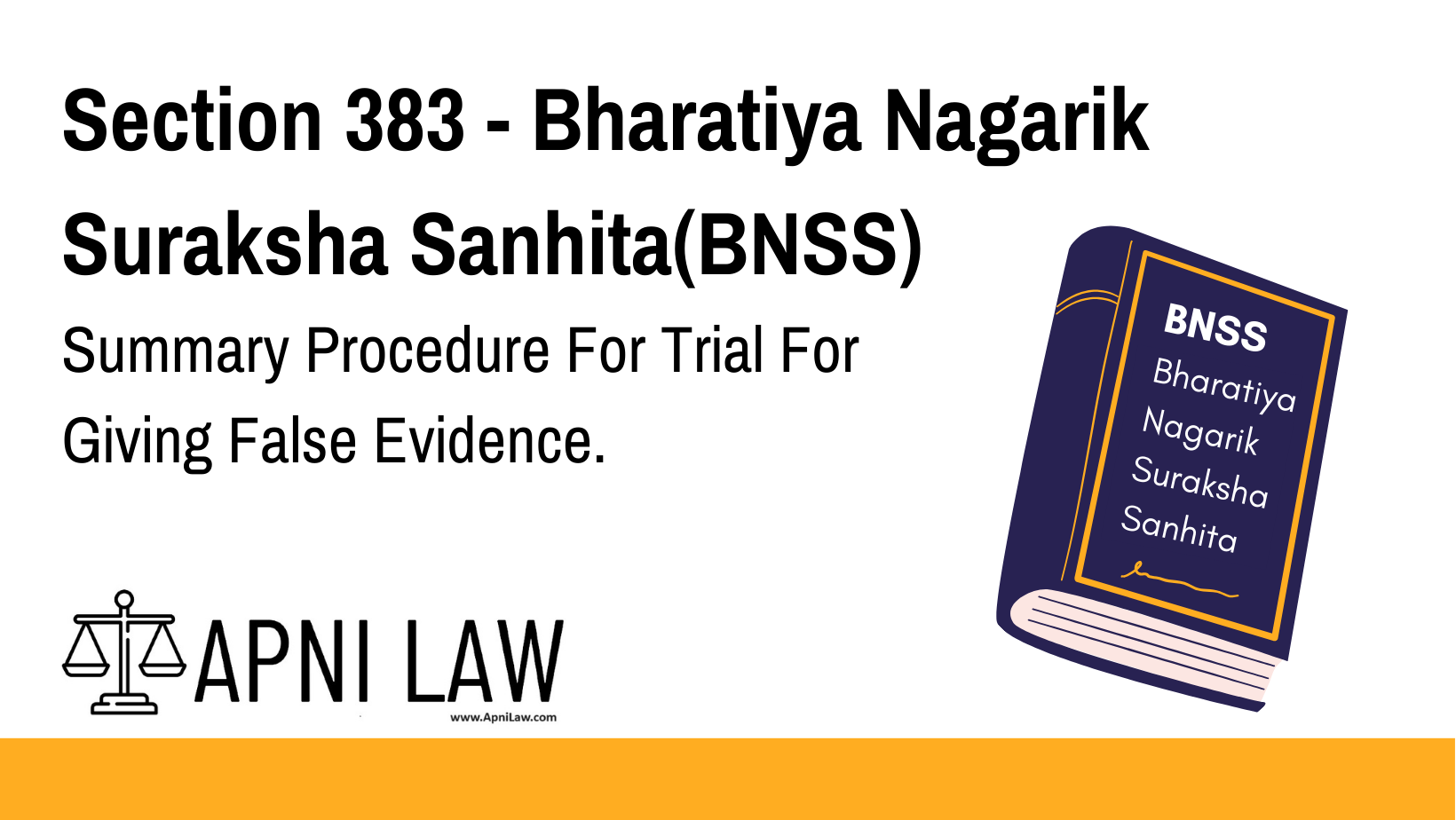Code: Section 383 BNSS
Summary Procedure for Trial for Giving False Evidence
383.
(1) If, at the time of delivering any judgment or final order disposing of a judicial proceeding, a Court of Session or a Magistrate of the first class forms an opinion that any witness knowingly or willfully gave false evidence or fabricated false evidence intending it to be used in the proceeding, the Court may:
- Take cognizance of the offense.
- Try the offender summarily if it is necessary and expedient in the interest of justice.
- Sentence the offender to imprisonment for a term up to three months, a fine up to one thousand rupees, or both, after giving them a reasonable opportunity to show cause why they should not be punished.
(2) The Court shall follow, as nearly as possible, the procedure prescribed for summary trials.
(3) This section does not affect the power of the Court to file a complaint under Section 379 BNSS for the offense if the Court chooses not to proceed under this section.
(4) If an appeal or application for revision is filed against the judgment or order in which the opinion about false evidence was expressed, the Court must stay further trial proceedings under this section until the appeal or application is disposed of. The trial shall then abide by the result of the appeal or application.
Explanation of Section 383 BNSS
Section 383 BNSS provides a legal mechanism for punishing witnesses who knowingly or willfully give false evidence or fabricate evidence in judicial proceedings. It allows a Court of Session or Magistrate of the first class to try such offenders summarily and impose penalties in the interest of justice.
Key Provisions:
-
Authority of the Court:
- If false evidence or fabricated evidence is detected, the Court may summarily try and punish the offender.
-
Reasonable Opportunity:
- Before sentencing, the offender must be given an opportunity to show cause why they should not be punished.
-
Procedure:
- The trial must follow the procedure for summary trials to ensure a swift and fair resolution.
-
Appeal or Revision:
- If an appeal or revision application is filed against the judgment or order expressing the opinion about false evidence, the trial must be stayed until the appeal is resolved.
-
Alternative Option:
- The Court retains the right to file a complaint under Section 379 BNSS instead of proceeding summarily under this section.
Illustrations:
Example 1:
A witness in a murder trial gives false testimony, claiming to have seen the accused commit the crime. During the delivery of the final judgment, the Court determines the witness knowingly fabricated the testimony. The Court, under Section 383, initiates a summary trial against the witness and imposes a fine of ₹1,000.
Example 2:
During a property dispute case, a witness fabricates documents to support one party. The Court detects the forgery during its judgment. After initiating proceedings under Section 383, the Court learns that an appeal has been filed in the case. The Court stays further action until the appeal is decided.
Common Questions and Answers on Section 383 BNSS
-
What is the purpose of Section 383 BNSS?
- It provides a quick and efficient mechanism to penalize witnesses who knowingly give false evidence or fabricate evidence, ensuring the integrity of the judicial process.
-
What punishment can be imposed under Section 383?
- The offender can be sentenced to imprisonment for up to three months, a fine of up to ₹1,000, or both.
-
Can the Court still file a complaint under Section 379 BNSS?
- Yes, the Court may choose to file a complaint under Section 379 BNSS if it decides not to proceed under Section 383.
-
What happens if an appeal is filed in the case where false evidence was detected?
- The Court must stay the summary trial under Section 383 until the appeal or revision application is resolved.
-
Does the offender have a chance to defend themselves?
- Yes, the offender must be given a reasonable opportunity to explain why they should not be punished.
Conclusion
Section 383 BNSS ensures that witnesses are held accountable for giving or fabricating false evidence during judicial proceedings. By allowing summary trials, it provides an efficient way to address such offenses while maintaining the integrity of the legal process.












